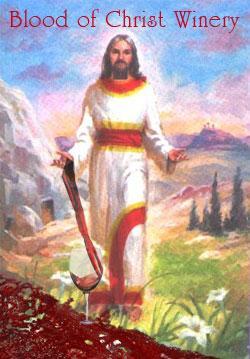Since at least the 8th millennium BCE, wine has been considered a sacred elixir and has been bound up with all manner of religious rituals. Several weeks ago, Aeon editor Ross Andersen posted a wonderful piece on the subject. Andersen’s vinous peregrinations touch on Rudolf Steiner and the theosophy of grape-growing. Because Steiner’s “biodynamic” ideas are thought to have deep pagan roots, Andersen considers this history and its relationship to Christianity:
Communion is usually thought of as a Christian rite, but there are versions of it that predate the last supper, the meal at which Christ pressed the grail to his lips, saying ‘This is my blood, poured out for you.’ Some historians of religion hear, in those words, an echo of Euripides, who wrote, of the Greek wine god Dionysus: ‘When we pour libations out, it is the god himself we pour out, and by this bring blessings on mankind.’
Euripides penned that sentence in the 5th century BC, at a time when Athenian elites participated in banquets of fellowship and philosophy called symposia. The ‘libations’ were the most sacred ritual at these banquets, and they were performed in honor of Dionysus, the god who ‘turned the grape into a flowing draft and proffered it to mortals’, so they could experience ecstasy. The parallels between Christ and Dionysus are striking. Both were the sons of a supreme deity and a mortal woman. Both were supposed to have been born in late December, just after the winter solstice. Both returned from the dead at the dawning of the earth’s springtime regeneration. And both inspired wine rituals.
By the time the New Testament was written, the Romans had renamed Dionysus, calling him Bacchus instead. But the myths written about him – the solstice birth, the mortal mother, the Easter resurrection – remained the same. No one can be sure if, and to what degree, these myths influenced early Christians, but we know they were in the air during Christianity’s early evolution, when communion, its most sacred ritual, was developed.
Is there a genealogical line of descent from Dionysus to Bacchus to Christ? I’m not sure, but as was the case with the idea of evolution in Darwin’s time, red wine as bloody sacrament was indeed in the liminal air between the old millenia and new. For those interested in the old millenia and precusor deity, I recommend Dan Stanislawski’s “Dionysus Westward: Early Religion and the Economic Geography of Wine” (1975) (see Resources tab above for pdf). Stanislawski fruitfully approaches the subject through the lens of historical geography and concludes:
The cult of Dionysus may have been the earliest of proselytizing cults. Greeks exported wine to some peoples who had not known it previously but who after knowing it would not relinquish it. Was eighth century B.C. Dionysus an early precursor of that combination which Tawney described under the title “Religion and the Rise of Capitalism”?
The advantages of the combination of wine and religion include exaltation for the mystic; a sense of unity with the whole and of belonging for the disinherited; courage for the timid; peace for the troubled spirit; nepenthe for the tortured soul; aphrodisiac for the lover; surcease for the pain-wracked; anesthetic for use in surgery; gaity for the depressed. In addition to its mystical or personal appeal, wine offered pecuniary advantages: vines produce a crop with an ever-ready market. They produce a crop of relatively high value on a wide variety of surfaces and soils: on slopes so steep that almost no other crop can be cultivated and on virtually sterile rocks; thence through a gamut of soils to alluvium; and in a wide variety of climates. They yield a product that has international appeal and international markets (even in early times). The beverage produced is not only attractive but also healthy in lands of little and often polluted water. It is a persuasive beverage that makes lasting friendships. Once it is known, a permanent and probably increasing market is virtually guaranteed.
Few forces in the affairs of men are more effective than profit in the odor of sanctity, especially when the major commercial product is as gustable as wine.
Stanislawski’s incisive last sentence always sparks stimulating discussions among my students, some of whom wonder whether Constantine’s conversion of the empire to Christianity was sanctimonious or profitable.


